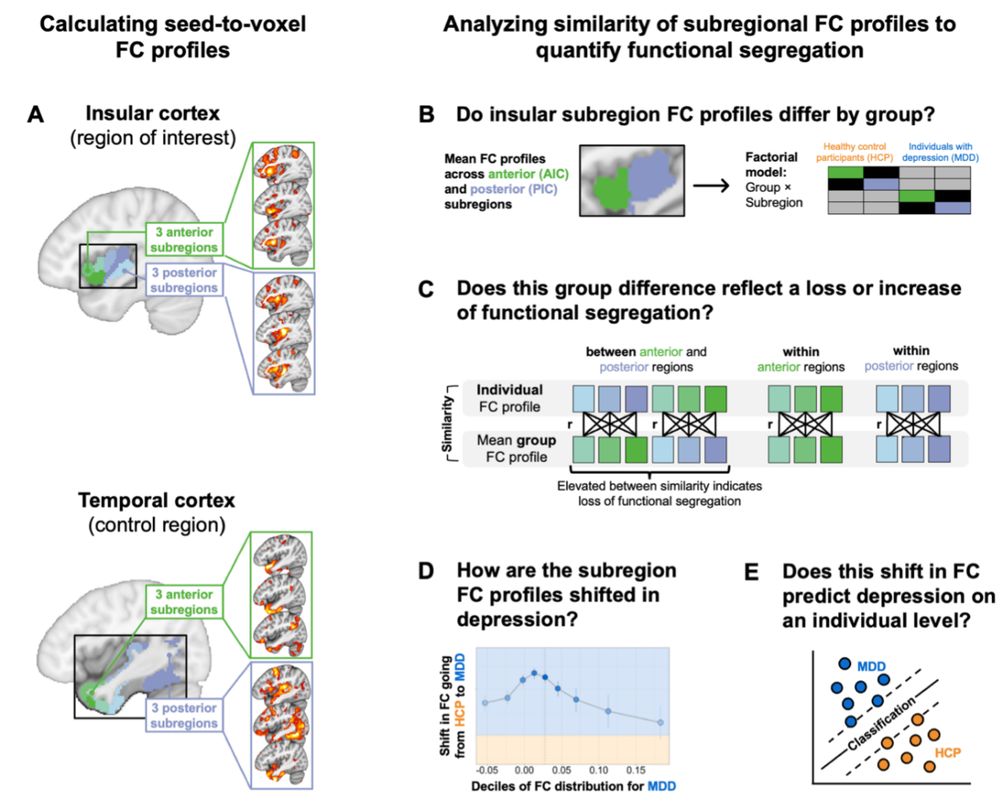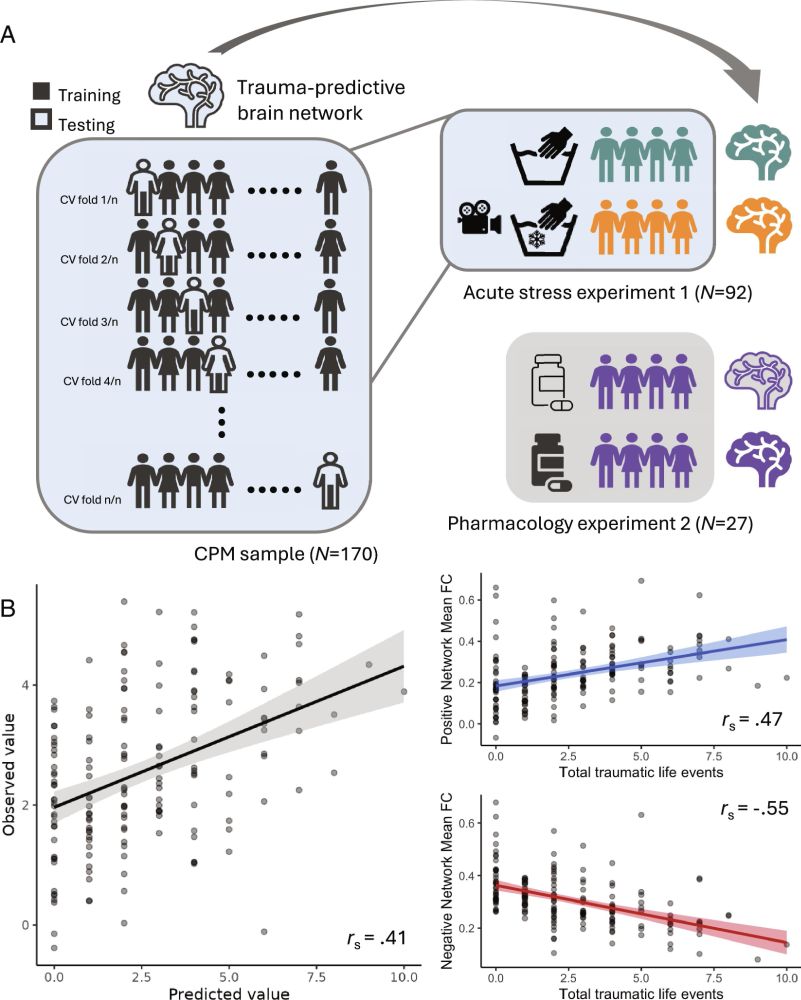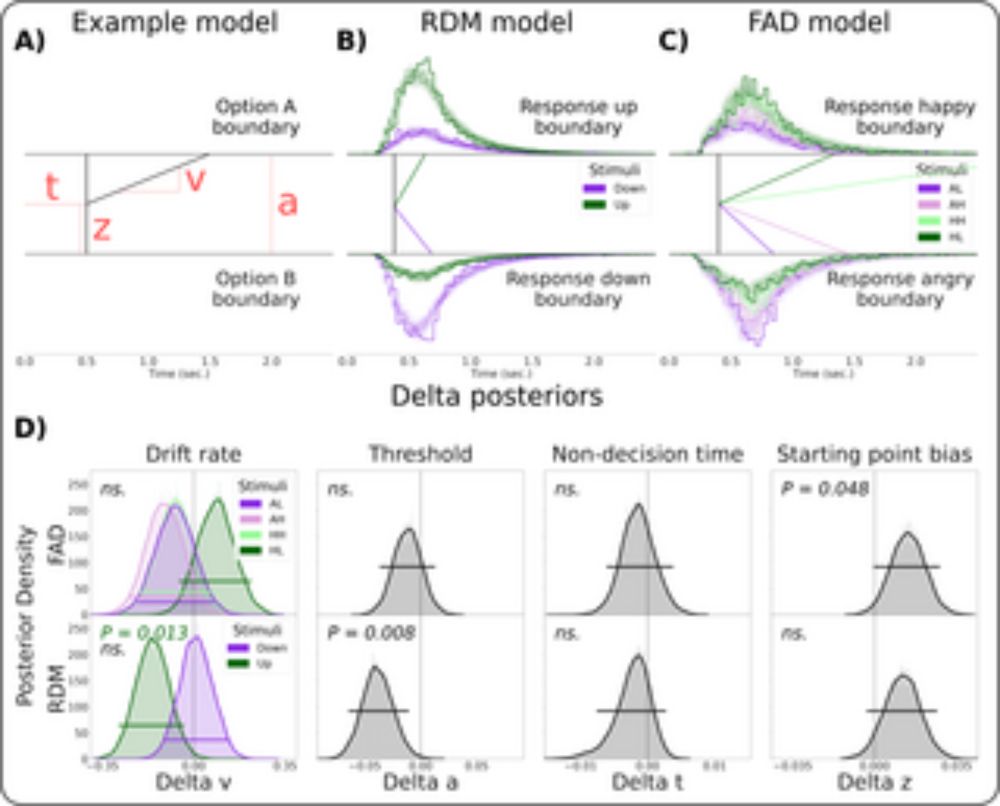
New primer in Cell from Patrick Haggard & @mattlongo.bsky.social
Somatosensation and the sense of self: Current Biology www.cell.com/current-biol...
#interoception #exteroception #affect #neuroskyence
@caesarliu.bsky.social
PhD student @PennStateBBH | interoception, affective science, adolescence, & brain dev | formerly CSUN

New primer in Cell from Patrick Haggard & @mattlongo.bsky.social
Somatosensation and the sense of self: Current Biology www.cell.com/current-biol...
#interoception #exteroception #affect #neuroskyence

Fleming and colleagues show that poorer glucose control is linked to greater reliance on recent rewards during learning, which subsequently linked to higher depression symptoms, identifying a potential pathways linking metabolic health to mental health.
29.10.2025 15:36 — 👍 6 🔁 2 💬 1 📌 0
Korom and colleagues show that attachment-based parenting intervention delivered during infancy shapes functional brain networks and associated regulatory health in youth at risk for maltreatment.
29.10.2025 15:39 — 👍 1 🔁 1 💬 0 📌 0
Young girls may be less responsive to food fullness cues than young boys, according to lead researcher Kathleen Keller. @katkellerlab.bsky.social
www.psu.edu/news/health-...
📣 Excited to share that my first paper is now published!
📄"Metabolic state shapes cortisol reactivity to acute stress: A systematic review and meta-analysis of metabolic and hormonal modulators"
You can find the full paper here:
doi.org/10.1016/j.yn...
We built the openESM database:
▶️60 openly available experience sampling datasets (16K+ participants, 740K+ obs.) in one place
▶️Harmonized (meta-)data, fully open-source software
▶️Filter & search all data, simply download via R/Python
Find out more:
🌐 openesmdata.org
📝 doi.org/10.31234/osf...

Excited to share that my TEDx talk is finally available online. I loved sharing what the science shows us: that it's time to reframe adolescence - from problem to ✨ potential ✨ 1/
www.youtube.com/watch?v=wr8V...

New lab paper in DCN! 🧠 We conducted interviews with adolescents to better understand their perceptions of neuroscience research and barriers to participation, w/qualitative data that is shaping how we design lab studies & efforts to increase representation.
www.sciencedirect.com/science/arti...

#ThisWeekInNPP
This 🔥 Hot Topic 🔥 from @tiffanycheingho.bsky.social discusses how the exposome - the sum of internal, external, and contextual exposures - shapes adolescent neuroplasticity & mental health risk and could present a novel opportunity to guide strategies to promote adolescent 🧠 health

Dense longitudinal neuroimaging reveals individual brain change trajectories
Review by Sophia Vinci-Booher, Xueying Ren, Kendrick Kay, Chen Yu, Franco Pestilli, & James Booth
tinyurl.com/jhb5py5d

Want to learn more about the Adolescent Brain Cognitive Development study?👀 Check out the ABCD-ReproNim course! The Fall 2025 course is going on NOW✨ Students may have the opportunity to participate in the 2026 hackathon in Miami🏝️ For more info: abcd-repronim.org 🎉
02.10.2025 20:19 — 👍 13 🔁 7 💬 1 📌 0
In this review, @lucinauddin.bsky.social and Hugh Garavan examine how task and resting-state fMRI can reveal brain-behavior relationships in youth, highlighting current controversies and challenges, outlining solutions, and proposing future directions in developmental neuroscience research.
01.10.2025 21:38 — 👍 18 🔁 8 💬 0 📌 1
Interested in the link between cardiovascular and mental health or, in other “words” the ❤️ and 🧠 through brain-body states? A new paper by our speaker and fellow Arno Villringer with @michaelgaebler.com and Vadim Nikulin sheds more light on these interactions: www.sciencedirect.com/science/arti...
25.09.2025 15:09 — 👍 14 🔁 7 💬 0 📌 1
Villringer et al. Figure 1. Conceptual framework for brain–body states

Villringer et al. Figure 2 Brain–body micro-, meso-, and macro-states can be distinguished on the basis of their duration and reversibility
'Brain–body states as a link between cardiovascular and mental health'
by Arno Villringer, Vadim Nikulin & Michael Gaebler @mbe-lab.bsky.social @michaelgaebler.com @mpicbs.bsky.social sky.social
www.cell.com/trends/neuro...

An interoceptive model of energy allostasis linking metabolic and mental health
New article by @saramehrhof.bsky.social and colleagues!
www.science.org/doi/10.1126/...

Most striking: altered gut perception patterns predicted six-month relapse risk and eating disorder symptom severity. This is the first evidence that gut interoception can forecast relapse in AN. Full details in our new preprint: www.medrxiv.org/content/10.1...
22.09.2025 20:13 — 👍 7 🔁 3 💬 2 📌 0
Two new preprints on multilevel HMMs! Time series data is now pervasive in psychology and new methods are needed to model the dynamics in such data. Hidden Markov Models (HHMs) are powerful models for dynamics in which a system is switching between a number of discrete states.
22.09.2025 11:10 — 👍 66 🔁 21 💬 2 📌 0
🚨 GRADUATE PHD APPLICATIONS OPEN 🚨
I'm accepting students for the next psychology PhD admissions cycle! If you're passionate about developmental neuroscience and clinical psychology, this might be for you 👇
#GradSchool #Psychology #Research /1

In this @cp-trendsneuro.bsky.social Spotlight, I describe how a recent paper by @leahbanellis.bsky.social, @brainandstomach.bsky.social, et al. opens new avenues in interoception research, including those focussed on the subjective interpretation of internal signals: www.cell.com/trends/neuro...
09.09.2025 11:32 — 👍 23 🔁 8 💬 1 📌 3So happy to share our paper on the role of the hippocampus as a mismatch detector:
doi.org/10.1073/pnas...
We show that the hippocampus detects mismatches between ongoing experiences and episodic memories but not generalised schematic knowledge.
See 🧵for how we got here:
#neuroskyence #PsychSciSky

Graphical summary of the analysis pipeline

Decreased similarity within the anterior insula cortex drives group differences between patients with MDD and healthy control participants. This difference is illustrated by shift functions and compared to control regions in the temporal cortex.

Patients with depression can be robustly classified based on functional connectivity profiles, and the accuracy improves with increasing symptom severity.
New preprint...and this one is truly EPIC 🚨.
Using a large group of patients with depression and healthy controls (N>800), we show differences in the functional segregation of insular subnetworks. And we can use it to classify!
Led by @glassybrain.bsky.social #neuroskyence 🩺
osf.io/preprints/ps...

Are interoception and mental health linked? Many assume so, with interoception even described as a psychiatric “p-factor.” But in our latest preprint, we were surprised to find little evidence for such a connection. www.medrxiv.org/content/10.1... 🧵 Thread with our reflections on the matter 👇
27.08.2025 16:17 — 👍 181 🔁 71 💬 8 📌 17
Spread the word!! DANS 2025 registration is opening very soon…take a look at some of our amazing speakers! You can present a poster you will present or have presented elsewhere…the goal is to foster discussion. Check dans.pitt.edu for updates!
21.08.2025 19:02 — 👍 4 🔁 5 💬 0 📌 1
Timing and plasticity are critical to progress in research on stress and neurodevelopment
@ariellekeller.bsky.social
@jamapediatrics.com
@utdallas.bsky.social
jamanetwork.com/journals/jam...

image shows four children posing as if they are thinking or considering an option with thought bubbles depicted above their heads
Demonstrates that while preschoolers initially rely on perceptual information from faces, this diminishes with age; the crux of emotional development in children shifts to conceptual knowledge gained through social experience. 🧪
www.nature.com/articles/s41...
#cogsci
#devsci
#AffectSci
#PsychSciSky

🆕 RESEARCH: Not all kids respond to early adversity the same way. We examined data from ~7,400 children for 4 years and found something notable about positive emotions & mental health outcomes...
doi.org/10.1101/2025...
A thread 🧵 #MentalHealth #ChildDevelopment #Resilience /1

Trauma-predictive brain network connectivity adaptively responds to mild acute stress www.pnas.org/doi/10.1073/...
04.08.2025 01:57 — 👍 11 🔁 4 💬 1 📌 0
Absolutely loved discussing our recent @natmentalhealth.nature.com paper on IhmCurious
YouTube channel (www.youtube.com/watch?v=dDTv...), thank you for having me! & to
@micahgallen.com @brainandstomach.bsky.social & the @the-ecg.bsky.social team for all their hard work 🧠

🧠 New paper on breathing and the brain, out now
@plos.org Computational Biology! 🫁
"The respiratory cycle modulates distinct dynamics of affective and perceptual decision-making"
doi.org/10.1371/jour...
We show how respiratory 'tidal computations' alter our decisons!